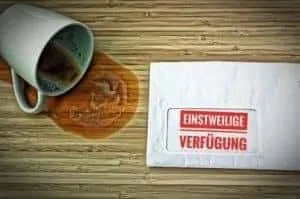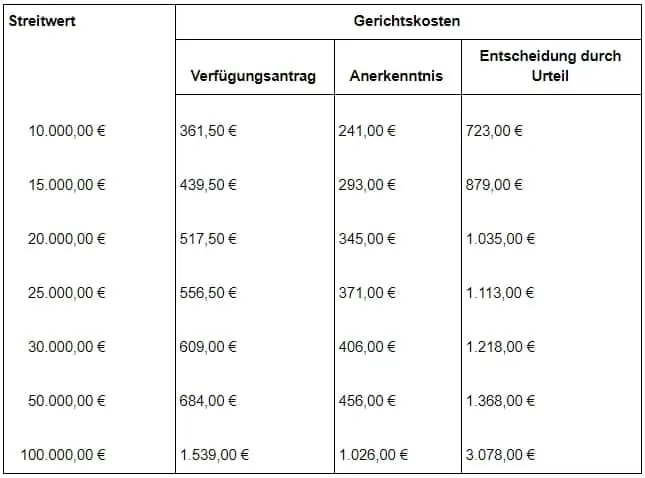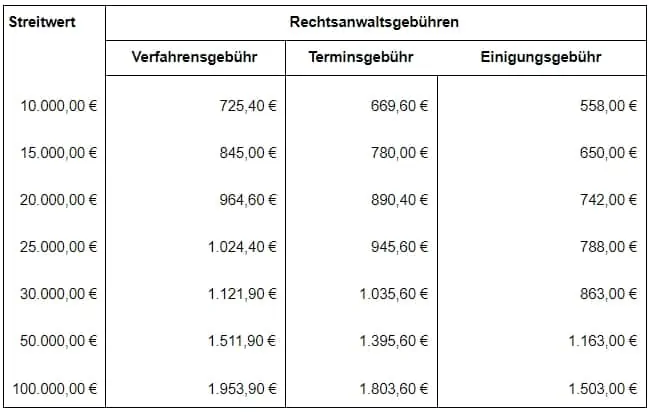Restraining order: Content, procedure and costs compact
In competition law, the interim injunction is the most common legal instrument besides the warning letter.

It serves to quickly settle a legal dispute, albeit provisionally.
The courts have set up extra emergency services so that an injunction can be issued within hours or the next day.
On the other hand, it usually takes several months to complete a legal action.
So if an infringement is to be prevented as quickly as possible, the interim injunction is the means of choice. In this article you will receive the answers from the specialist lawyer to the 10 most important questions on the subject.
Content
1. What does temporary mean?
2. Wow can I apply for an interim injunction?
3. Under what conditions is a temporary injunction issued?
4. What does urgent mean? How much time do I have to apply for the injunction?
5. What evidence do I need?
6. The motion has been filed. What happens next?
7. What costs do I have to expect when applying for a temporary injunction?
8. What is a final statement and when should I take it into account?
9. I have been warned and I do not think the warning is justified - What can I do?
10. I have received a preliminary injunction. How can I react?
1. What does temporary mean?
Good things take time. Lawsuits just take time. First, the facts of the case must be established and, if necessary, proven by witnesses or experts. Furthermore, the parties involved need sufficient space to present their arguments.
However, an entrepreneur whose business is endangered, for example by illegal advertising by a competitor, does not have this time. Once the child has fallen into the well, the prospect of later compensation for damages is at best a small consolation.
This is where the restraining order comes in. The judicial procedure is considerably shortened and a quick decision is made, which is not final, but should help to avert irreparable disadvantages.
This speed also has a price. The preliminary injunction is usually based on the facts or assertions of facts communicated (and substantiated by the applicant). These may prove to be correct or false in the course of proceedings.
Despite its provisional nature, in practice the interim injunction often leads to a final settlement of the dispute. For example, if the defendant makes a so-called final declaration.
The injunction can be issued at the same time as the main action (usually an action for injunction), but this is rather unusual in practice.
2. How can I apply for an injunction?
In order to apply for an interim injunction, you must file an application to the competent court.
The court of the main proceedings (§ 937ZPO), i.e. the court which would also have jurisdiction for the main proceedings, is locally competent to issue the interim injunction. Due to the so-called flying jurisdiction there is a wide range of possible courts, especially for Internet violations.
In short: If the infringement is committed on the Internet, it can also be viewed throughout Germany, with the result that all 115 regional courts (!) currently have local jurisdiction. So if a Munich company violates the law on the Internet, a competitor based in Berlin can sue the company in Hamburg.
This flying jurisdiction has fallen somewhat into disrepute, since in this way, for procedural reasons, travel costs are required, for example, which may deter the opponent from opposing the case.
This may happen sporadically. However, the flying jurisdiction has led to the fact that individual jurisdictions (e.g. the Regional Court of Hamburg) have been able to specialise in certain areas and are therefore preferred by all parties.
In competition disputes, the regional courts have exclusive jurisdiction (Section 13 UWG). This means: the obligation to employ a lawyer applies! You must therefore be represented by a lawyer.
As the interim injunction is rather unusual in other fields of law, it seems highly advisable to engage a lawyer specialising in competition law or, at the same time, a lawyer specialising in industrial property rights.
3. Under what conditions is an injunction issued?
The precondition for the issue of a restraining order is that
- an infringement of competition (so-called right of disposal) and
- the urgency of the matter (so-called reason for disposal)
be presented (explained) and proven (credible). The claimant must therefore explain to the court that there has been an infringement, which must be brought to an end as soon as possible.
4. What means urgent? How much time do I have to apply for the injunction?
In the case of an application for an injunction, the court will examine of its own motion whether the matter is urgent (i.e. urgent). This urgency is initially presumed in competition cases (Section 12(2) UWG). However, this presumption is rebutted if you wait too long before filing the application.
So if you want to get a quick decision from the court, you are well advised not to waste any time yourself. In other words..: If you are not in a hurry, the court will not make a hurried decision. So do not wait too long before applying for an interim injunction.
The courts answer differently as to when a delay is harmful. Practitioners like to speak of a north-south divide between the more impatient, because stricter southern German courts, and the somewhat more relaxed northern German courts.
However, the situation tends to become critical if more than one month has elapsed between knowledge of the infringement and submission of the application.
5. What evidence do I need?
A special feature of the injunction proceedings is that a prima facie evidence is admissible instead of the so-called strict evidence (i.e. expert witness, inspection, document, witness, hearing of parties), thus considerably facilitating the presentation of evidence.
As a rule, the credibility will be established by an affidavit of the applicant. In this way he affirms "in lieu of oath" that his statement is true.
Care: Since the making of a false affidavit is punishable by imprisonment for up to 3 years or a fine (§ 156 StGB), it should only be formulated with the utmost care.
In addition, it is customary to enclose copies of the underlying warning, printouts of relevant Internet pages or similar with the application. Witnesses can also be suspended (i.e. simply brought along and heard) during the oral proceedings.
6. The application was made What happens next?
After receipt of the application for a court order, the competent regional court will examine the conditions for issuing the requested court order. It can decide with or without hearing the respondent. It is therefore possible that the opponent will become aware of the order for the first time upon service of an order!
In addition, it is not unusual for the judge to call on the lawyer to express concerns, for example, about the wording of the applications or to communicate a different legal opinion.
However, the court also checks whether the order was preceded by a warning. If not, it will usually set a date for an oral hearing before the order is issued, thus giving the opponent the opportunity to comment.
Decision of the regional court: justified or unjustified
If the Regional Court considers the order to be justified, it will issue the order. This so-called order will be sent to the applicant. This is also a further difference to the lawsuit procedure, where judgements are served ex officio.
It is then up to the applicant to serve the order on the opponent. As a rule, he will appoint a bailiff for this purpose or, if the opposing party is represented by a lawyer, he will serve the writ on the opposing lawyer (so-called lawyer-to-law service). Here too, haste is required.
If, on the other hand, the Regional Court considers the order to be unjustified, it will either reject it directly by order or set a date for an oral hearing. At this date, the defendant will also be summoned and can present and substantiate new facts until the end of the oral proceedings.
If the application for an order is granted, the defendant is prohibited from performing a precisely defined act. In the event of further infringements, the defendant is threatened with disciplinary measures. As a rule, a fine of at least 5000€ to a maximum of 250000€ or imprisonment for 1 day to 6 months is a regulatory measure.
In this respect, the means of order are comparable to the agreement of a contractual penalty. From the point of view of the person who has been warned, regulatory measures can nevertheless be advantageous because, in contrast to the contractual penalty, they are not payable to the person who has been warned but are made available to the general public.
This deprives the warning officer of a financial incentive to monitor and prosecute possible subsequent infringements. Furthermore, fines are often lower than at least fixed contractual penalties.
7. What costs should I expect to pay when applying for an injunction?
Legal proceedings cost money and this, often not too little. Comprehensive information about the expected costs of legal proceedings is therefore one of the most important tasks of the lawyer (see § 49b para. 5 BRAO). And this, of course, before they have arisen.
Often, however, it is not yet possible to predict exactly what costs will be incurred before legal action is taken. This usually has the following reasons:
- The amount in dispute is not known and must be estimated.
- The outcome of the proceedings is uncertain
- The opponent makes a counterclaim increasing the amount in dispute
The following types of costs are incurred as a result of the application for an interim injunction:
- Legal costs
- Attorney's fees
- Bailiff fees
The amount of court costs and attorney's fees depend on the amount in dispute and the progress of the proceedings. The amount of the bailiff's fees depends on the scope of the activity to be performed by the bailiff (so-called enforcement order).
7.1 What is the amount in dispute and how is it calculated?
Court and attorney fees are dependent on the amount in dispute. Proceedings with a higher amount in dispute incur higher fees than proceedings with a lower amount in dispute. And this is the case even if the actual activity of the court or even the lawyer is not very different.

This may seem unfair in individual cases, but is the result of a mixed calculation. This ensures that even the smallest claims, for example, can be legally asserted.
If, on the other hand, the actual costs of proceedings were always incurred, proceedings with amounts in dispute of less than 10000€ would not be economically feasible.
The amount in dispute is determined by the economic significance of the proceedings. This is relatively simple in the case of a payment claim (e.g. a purchase price claim).
In this case, the amount in dispute corresponds to the main claim (i.e. the purchase price). However, since the interim injunction is not intended to prohibit a payment, but rather the omission of a specific action, the court or attorney must assess the value of this injunction.
In practice, it is useful to follow previous decisions. However, since hardly any legal dispute is similar to another, the determination always remains an individual case decision.
7.1.1 Amounts in dispute in competition matters
In simple competition cases, the amounts in dispute are usually between 10000€ - 20000€. Depending on the importance of the case, however, values of 100000€ and more are not uncommon.
7.1.2 Amounts in dispute in trade mark matters
In trade mark matters, the amounts in dispute regularly amount, depending on the use and reputation of the mark, to at least
- 25000€ (for unused or unknown trademarks),
- 50000€ (for used but hardly known trademarks),
- 100000€ for trademarks used for many years but hardly known),
- 100000€ and more (for well-known brands).
7.1.3 Amounts in dispute in design disputes
Here, the amounts in dispute easily amount to 50000€, for everyday products (such as textiles or food) regularly 150000 – 250000€. In the case of particularly well-known product designs, e.g. the design of a car, 500000€ and more can also be assessed.
7.2 What legal costs must I expect?
A 1.5 court fee is payable for the application for a preliminary injunction. Depending on the outcome of the proceedings, this can be reduced to 1.0 fees (e.g. the application for a temporary injunction is recognised or the case is compared) or doubled to 3.0 fees if an objection is filed against the injunction and a decision is reached by means of a judgment.
Examples (Status: Court Costs Act of 01.08.2013)

You can find a calculator to calculate the court costs and also for other amounts in dispute here.
7.3. And the attorney fees, are they negotiable?
In principle, it is possible to apply for an interim injunction even without a lawyer. For this purpose, you can go to the office of the competent district court, for example. The judicial officers there will then help you to formulate the application.
In competition matters, however, there is regularly a requirement to hire a lawyer. Either the matter is assigned to the regional court (and there the obligation to hire a lawyer exists) by law, or the amount in dispute exceeds 5000€ and can therefore also only be negotiated with the help of a lawyer (so-called lawyer's trial).
The following fees are charged on the applicant's side:
- for the application for interim measures: 1.2 procedural fee, No 3100 VV RVG
- for the perception of oral proceedings after opposition (defendant appears) 1.2 Deadline fee, No 3104 VV RVG
- for the perception of oral proceedings after opposition (defendant does not appear or does not file a request) 0,5 Deadline fee, No 3105 VV RVG
On the side of the opponent the following fees are conceivable:
- Filing of an opposition against a preliminary injunction or filing of a protective brief 1.2 Procedure fee, No. 3100 VV RVG
- Exercise of oral proceedings Term fee (see above)

You want to calculate the attorney fees for another amount in dispute? You can find a calculator here.
The German Federal Lawyers' Act (Bundesrechtsanwaltsordnung) prohibits lawyers from charging lower fees than those agreed upon by law (§ 49 b BRAO). Only in exceptional cases can different fee agreements be made (e.g. a performance agreement). However, lawyers are free to agree on higher fees; of course only if the client agrees to this.
7.4. what is the situation regarding bailiff costs?
If the injunction is granted, it must be served on the defendant within one month.
Service is usually effected by a bailiff. The costs for this usually amount to between 15€ and 40€ per service.
7.5. We have obtained a restraining order. Does the opponent have to reimburse the costs?
Yes. There's a principle of who pays who loses. Your lawyer will therefore submit a corresponding request to the court after the proceedings have ended.
8. What is a closure declaration and when should I take it into account?
Provisional injunctions serve to settle a legal dispute as quickly as possible. They are standard practice, particularly in disputes relating to competition law or trademark law. Nevertheless, they only contain a provisional settlement. In order to avoid further costly litigation, the so-called closure procedure has developed in practice.
8.1 What is the purpose of a closure procedure?
Final declaration and letter are part of the so-called closure procedure. With the final letter the so-called final proceedings are initiated and the opponent is requested to acknowledge a preliminary injunction as final by submitting a final declaration. Similar to the warning letter, the final proceedings are intended to prevent further legal disputes (here the action or main proceedings).
The conclusion procedure can thus avoid another procedure that is subject to costs.
It also serves to avoid immediate recognition. According to § 93 ZPO, the court can order the plaintiff to pay the costs of proceedings if the defendant acknowledges the claim and has not previously given cause for action. If the final proceedings were properly conducted before the action was brought, the defendant must bear the costs of the action even if he immediately acknowledges the action.
8.2 What should be the content of the final declaration?
Since the final declaration is intended to make the provisional title definitive, you are asked to waive any substantial rights. In particular, these rights are the following remedies:
- Opposition, § 924 ZPO,
- Setting of a time limit for filing the principal action, § 926 ZPO,
- Application for cancellation due to changed circumstances, § 927 ZPO.
By submitting the declaration, you can no longer oppose the order. An otherwise possible negative declaratory action would also no longer be admissible due to the lack of a legal interest in legal protection.
8.3 What are the costs of a closure declaration and who bears them?
Final letters are usually prepared by a law firm. This results in attorney fees. Usually, a 1.3 business fee, No. 2300 VV RVG plus expenses and, if applicable, value added tax is charged. The amount of the fees depends on the respective amount in dispute. Costs in the amount of 1000€ - 2000€ are to be expected.
The sender of the final letter will now demand that you reimburse the costs in addition to the final declaration. However, a reimbursement obligation only exists if the closing letter was required. This is not the case, for example,
- if you have previously submitted a closure declaration on your own initiative, or
- has already submitted to a third party, or
- you have not been given sufficient time (usually 14 days from service of the order) to make your own final declaration
8.4 When is a closing letter permissible?
First of all, the final letter necessarily presupposes that a restraining order has been issued against you and served on you. The final letter itself can be sent immediately upon delivery.
However, if the lawyer's fees associated with the final letter are to be reimbursed, the other party must be given sufficient time to make a final declaration itself. This also makes sense, as it is not uncommon for the interim injunction to be issued without any prior warning.
Case law therefore requires that a waiting period must first be granted. With this period the other party is given the opportunity to examine the legality of the order and its judicial justification. This period should be at least 2 weeks from the date of service of the order.
In addition, a declaration period of at least another 2 weeks must be granted. This period serves to check whether a declaration should be made.
In short, we recommend sending the final letter after 14 days and requesting in this letter within a further 14 days to submit a final declaration.
8.5 Is it possible to make the final declaration informally?
The final letter can be sent informally. However, the opposing party may insist on the written form for reasons of evidence. E-mail, fax or even oral statements are then not sufficient.
The final letter and final declaration should always be in writing. However, the letters can be sent in advance by e-mail or fax to meet the deadline.
9. I have been warned and I do not think the warning is justified - What can I do?
The warning letter threatened to issue a temporary injunction? In the case of unjustified warnings, it is advisable to regularly submit a so-called protective brief to the court in advance to inform it of his view of the matter, in order to achieve the rejection of the application or at least the scheduling of an oral hearing.
In practice, when a protective order is issued, it is often not known whether the opposing party even applies for an interim injunction and, if so, at which court it will file the order.
In the past, this meant that the protective brief had to be sent to a large number of possible courts. With currently 115 regional courts in Germany, this is no easy task. Since the establishment of the central register of protective letters in 2016, this has become much easier. Now, for a relatively small fee of currently 83€ (§ 1 No. 5a Judicial Administration Costs Act; No. 1160 KV) the protective brief can be filed.
Via the register of protective documents, the regional courts then have access to the respective deposited protective documents before issuing a temporary injunction.
10. I got a restraining order. How can I respond?
The first important thing is that you react everywhere. Doing nothing is not an alternative and entails immense follow-up costs.
Immediately after receiving an injunction, you should check whether the facts have been accurately reproduced and whether this constitutes an infringement of competition law.
I recommend that the order be examined by a lawyer specialising in competition law. As a lawyer specialising in intellectual property rights, I will examine the injunction for possible errors of law and develop a suitable defence strategy with you. Depending on the prospects of success, a possible strategy includes
- lodging of an appeal
- production of a final letter
- Saying a counter-reminder
- Application for a negative declaratory judgment
As a specialist lawyer for industrial property rights, dealing with preliminary injunctions is part of our daily work. We can assess whether the injunction was issued rightly or whether there are prospects of successfully attacking it in ordinary proceedings.
Since interim injunctions are rather unusual in other fields of law, we have experienced that colleagues who do not specialize in competition law or trademark law do not make use of the possibility of a final injunction. This results in unnecessary proceedings and costs.
As a lawyer and specialist solicitor for industrial property rights, we actively advise you on the advantages and disadvantages of a final declaration and can thus prevent further costs.Then ca
Do you need help with a temporary restraining order?
Then call us now at 040 3501 6360 or send an email to info@kanzlei-bennek.de.
picture source: picture 1: © DatenschutzStockfoto, picture 2: © vege / fotolia.com


